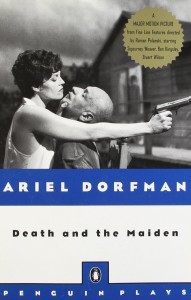 A review committee in Rumson, New Jersey found this week that Ariel Dorfman’s play Death and the Maiden and Bernard MacLaverty’s novel Cal are appropriate for upper-level high school students and thus should remain on the reading list at Rumson-Fair Haven Regional High School.
A review committee in Rumson, New Jersey found this week that Ariel Dorfman’s play Death and the Maiden and Bernard MacLaverty’s novel Cal are appropriate for upper-level high school students and thus should remain on the reading list at Rumson-Fair Haven Regional High School.
The committee was formed last month after some parents started an online petition calling for the removal of the two works from the curriculum, along with “any other material that is not age appropriate.” The petition was shut down after only a few days, but the parents pursued a formal challenge with the district. CBLDF and other organizational members of the National Coalition Against Censorship’s Kids’ Right to Read Project sent the district a letter advocating for “curricular decisions based on artistic and educational merit, and not based on the views of a small number of community members.”
At the school board meeting this week, review committee members pointed out that individual students or their parents can always request an alternate reading assignment, and that in any case 11th and 12th grade students “should not be surprised” by brief sex scenes because by that age they’ve already passed through multiple sex ed units in health class.
The committee also tried its best to find a way to “accommodate a request from parents to give all students options on books to read that meet certain literary topics,” but quickly realized the impossibility of that task:
Doing so would not work because part of the in-class work is analyzing the texts….To accomplish that with students reading multiple books, teachers would have to prepare multiple lessons, which ultimately would cut down on discussion time for each lesson.
One particularly heartening testimony in support of the books came from parent Katy Badt-Frissora, who was initially upset that her son had been assigned to read Death and the Maiden, but was then surprised by his mature analysis of the play’s themes and symbolism:
Badt-Frissora said her perspective changed when her son, who normally does not talk about his school work, spent 10 minutes explaining to her how the [sex] references represented the experiences during the dictatorship of Augusto Pinochet in Chile, how the book paralleled the ongoing conflict in Syria and it fit into a broader discussion about revenge.
“Literally, this kid educated me in such a profound way,” she said. “It’s risque, it was uncomfortable, but it worked.”
Kudos to the Rumson-Fair Haven school board and the review committee for approaching these two works with open minds, and especially for trusting teachers’ judgment as to what sort of challenging material they can share with their advanced students!
Help support CBLDF’s important First Amendment work in 2015 by visiting the Rewards Zone, making a donation, or becoming a member of CBLDF!
Contributing Editor Maren Williams is a reference librarian who enjoys free speech and rescue dogs.